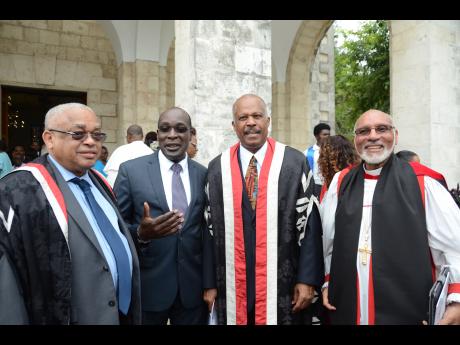Very high percentage of Jamaicans have no access to tertiary education
Local Anglican Bishop, the Reverend Howard Gregory has expressed disappoint-ment that even after 70 years, the majority of citizens in the English-speaking Caribbean still don’t have access to tertiary education at the University of the West Indies (UWI).
UWI celebrates its 70th anniversary this year.
At an interfaith convocation service yesterday at the University Chapel at UWI, Mona in St Andrew, which marked the anniversary, Gregory highlighted that only 15 per cent of Jamaica’s workforce has tertiary-level education qualifications.
“Seventy years after coming into being, the Caribbean still has the lowest level of its population having access to tertiary education in the Western Hemisphere. The reality is that only 19 per cent of Jamaicans aged 19-24 are currently enrolled in tertiary education, and only 15 per cent of the workforce has a tertiary education,” Gregory said.
“In an address delivered by president of the Caribbean Development Bank, Dr William Warren Smith at the annual conference of the Association of Caribbean Higher Education Administrators, he underscored that higher education equips recipients with knowledge, skills and attitudes that help formulate and preserve society’s fundamental values. It is the vehicle that spurs the growth of human capital. It provides access to the new technological capabilities which underpin social and economic development.”
STRENGTHENING INTEGRATION
Gregory stated that the UWI has contributed significantly to the strengthening of Caribbean integration over the years, but highlighted that some persons have been working to discredit the university.
“This institution, while making a name for itself internationally, has come under a lot of criticisms among Caribbean governments, the public, and the private sector. Some bemoan the fact that Latin is not being taught in all the classrooms. The business sector also offers its criticisms, for our not turning out job-ready persons. There are others who view the university as an ivory tower, in a state of academic seclusion, while there are others who believe that the university is not pursuing and promoting sufficient research.”
He continued: “It is true that this university has much more to offer to the Caribbean by way of research, but this will only happen through a process of dialogue, by which governments and the private sector can indicate the kind of research that can be useful.”

